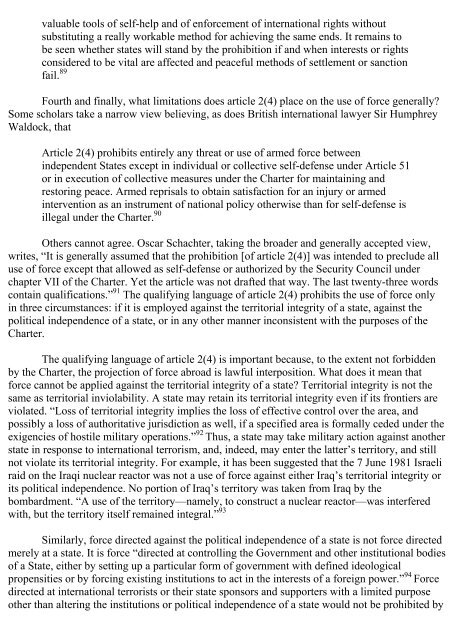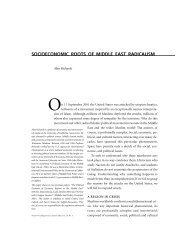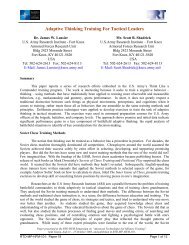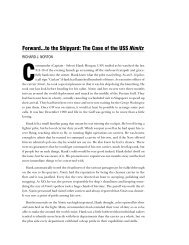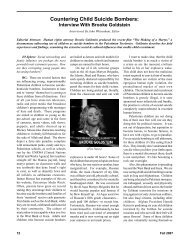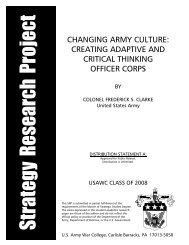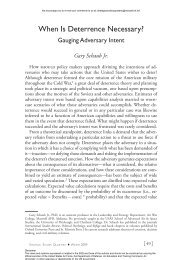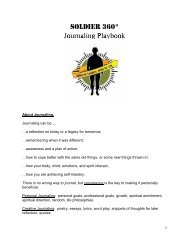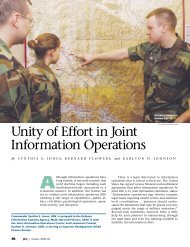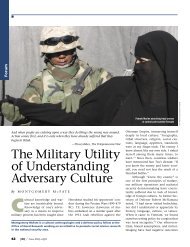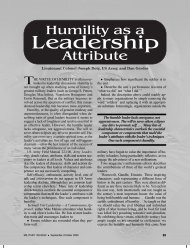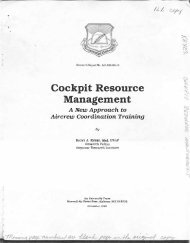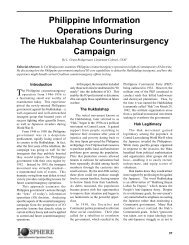Legitimate use of military force against state-sponsored - Air University
Legitimate use of military force against state-sponsored - Air University
Legitimate use of military force against state-sponsored - Air University
Create successful ePaper yourself
Turn your PDF publications into a flip-book with our unique Google optimized e-Paper software.
valuable tools <strong>of</strong> self-help and <strong>of</strong> en<strong>force</strong>ment <strong>of</strong> international rights without<br />
substituting a really workable method for achieving the same ends. It remains to<br />
be seen whether <strong>state</strong>s will stand by the prohibition if and when interests or rights<br />
considered to be vital are affected and peaceful methods <strong>of</strong> settlement or sanction<br />
fail. 89<br />
Fourth and finally, what limitations does article 2(4) place on the <strong>use</strong> <strong>of</strong> <strong>force</strong> generally?<br />
Some scholars take a narrow view believing, as does British international lawyer Sir Humphrey<br />
Waldock, that<br />
Article 2(4) prohibits entirely any threat or <strong>use</strong> <strong>of</strong> armed <strong>force</strong> between<br />
independent States except in individual or collective self-defense under Article 51<br />
or in execution <strong>of</strong> collective measures under the Charter for maintaining and<br />
restoring peace. Armed reprisals to obtain satisfaction for an injury or armed<br />
intervention as an instrument <strong>of</strong> national policy otherwise than for self-defense is<br />
illegal under the Charter. 90<br />
Others cannot agree. Oscar Schachter, taking the broader and generally accepted view,<br />
writes, “It is generally assumed that the prohibition [<strong>of</strong> article 2(4)] was intended to preclude all<br />
<strong>use</strong> <strong>of</strong> <strong>force</strong> except that allowed as self-defense or authorized by the Security Council under<br />
chapter VII <strong>of</strong> the Charter. Yet the article was not drafted that way. The last twenty-three words<br />
contain qualifications.” 91 The qualifying language <strong>of</strong> article 2(4) prohibits the <strong>use</strong> <strong>of</strong> <strong>force</strong> only<br />
in three circumstances: if it is employed <strong>against</strong> the territorial integrity <strong>of</strong> a <strong>state</strong>, <strong>against</strong> the<br />
political independence <strong>of</strong> a <strong>state</strong>, or in any other manner inconsistent with the purposes <strong>of</strong> the<br />
Charter.<br />
The qualifying language <strong>of</strong> article 2(4) is important beca<strong>use</strong>, to the extent not forbidden<br />
by the Charter, the projection <strong>of</strong> <strong>force</strong> abroad is lawful interposition. What does it mean that<br />
<strong>force</strong> cannot be applied <strong>against</strong> the territorial integrity <strong>of</strong> a <strong>state</strong>? Territorial integrity is not the<br />
same as territorial inviolability. A <strong>state</strong> may retain its territorial integrity even if its frontiers are<br />
violated. “Loss <strong>of</strong> territorial integrity implies the loss <strong>of</strong> effective control over the area, and<br />
possibly a loss <strong>of</strong> authoritative jurisdiction as well, if a specified area is formally ceded under the<br />
exigencies <strong>of</strong> hostile <strong>military</strong> operations.” 92 Thus, a <strong>state</strong> may take <strong>military</strong> action <strong>against</strong> another<br />
<strong>state</strong> in response to international terrorism, and, indeed, may enter the latter’s territory, and still<br />
not violate its territorial integrity. For example, it has been suggested that the 7 June 1981 Israeli<br />
raid on the Iraqi nuclear reactor was not a <strong>use</strong> <strong>of</strong> <strong>force</strong> <strong>against</strong> either Iraq’s territorial integrity or<br />
its political independence. No portion <strong>of</strong> Iraq’s territory was taken from Iraq by the<br />
bombardment. “A <strong>use</strong> <strong>of</strong> the territory—namely, to construct a nuclear reactor—was interfered<br />
with, but the territory itself remained integral.” 93<br />
Similarly, <strong>force</strong> directed <strong>against</strong> the political independence <strong>of</strong> a <strong>state</strong> is not <strong>force</strong> directed<br />
merely at a <strong>state</strong>. It is <strong>force</strong> “directed at controlling the Government and other institutional bodies<br />
<strong>of</strong> a State, either by setting up a particular form <strong>of</strong> government with defined ideological<br />
propensities or by forcing existing institutions to act in the interests <strong>of</strong> a foreign power.” 94 Force<br />
directed at international terrorists or their <strong>state</strong> sponsors and supporters with a limited purpose<br />
other than altering the institutions or political independence <strong>of</strong> a <strong>state</strong> would not be prohibited by


